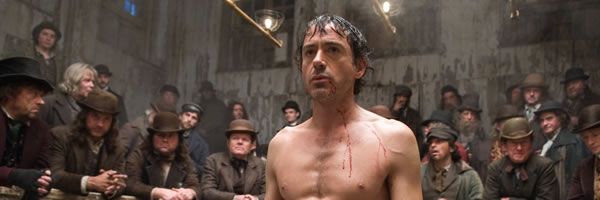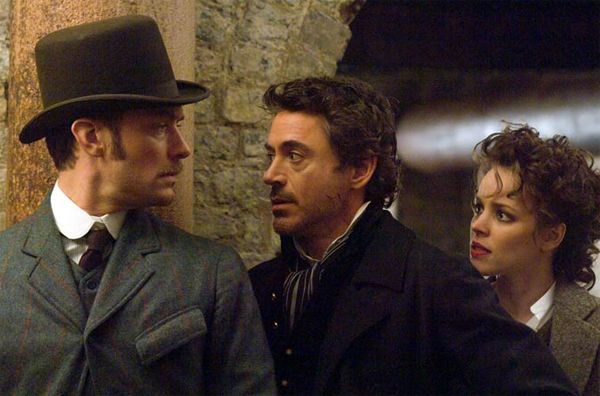The biggest hurdle facing Sherlock Holmes is convincing audiences to change their preconceptions of the character and accept a modernized-albeit set in the late 19th century-version of the characters. Ironically, viewers already have if they watch the popular television show House, M.D. (House=Holmes, Wilson=Watson). The banter between Holmes (Robert Downey Jr.) and Watson (Jude Law) is where the film shines but all its other elements including the vivid cinematography, Hans Zimmer's memorable score, and Guy Ritchie's hyper-active style make Sherlock Holmes a fun, fast-paced adventure.
In a surprising move from Hollywood, a town that will suck from any source material possible to prevent the risk of financing an original idea, Sherlock Holmes is not based on any of Sir Arthur Conan Doyle's novels but rather takes the characters and puts them into a new story. The mystery this time revolves around defeating occultist Lord Blackwood (Mark Strong) who plans to rule the world using the dark arts. Holmes catches Blackwood before he sacrifices his seventh victim and several months later Blackwell hangs at the gallows...only to turn up quite alive and still intent on the whole world-domination thing. It would be the perfect mystery for Holmes and Watson to solve except Watson has had enough of Holmes' antics and is leaving 221B Baker Street to wed Mary Morstan. But Watson just can't quit his co-dependent relationship with Holmes and he's dragged along as Holmes tries to solve this new mystery. Spurred on by taking a case from the lovely Irene Adler (Rachel McAdams), a clever criminal who once managed to outwit the genius detective and stole his heart, the game is afoot, and afist, and anexplosion, and abanter.
The old married-couple bickering between Holmes and Watson comes right up to the line of overbearing, but Downey and Law always manage to keep it light and fun, and as a result their relationship becomes the heart of the film thus preventing the stylized touches from feeling crass and hollow. That was the big risk in hiring Ritchie who's best known for his films Lock, Stock, and Two Smoking Barrels and Snatch. I'm of the opinion that his direction is energetic and fun, but I completely understand those who feel that Ritchie appeals to the worst aspects of mainstream moviemaking by crafting his films to the ADD crowd. However, those people should know he does try to restrain himself, but falls back into old habits when demonstrating Holmes' "superpowers" of deductive reasoning, bare-knuckle boxing, and disguise. Ritchie is far more successful in using the captivating cinematography to capture the gritty appeal of London at the turn of the century. However, he falters with the film's overall pacing and I feel that if Ritchie had locked this down he could have turned Sherlock Holmes from a good film to a great one. But at the end of the day, his crazy yet cocksure direction mirrors Holmes' attitude and proves that he was a solid choice to direct this movie despite the initial online controversy surrounding his hiring.
Those never exposed to Sherlock Holmes beyond the vague idea of the stodgy Brit in the deerstalker cap and cloak while wielding a giant magnifying glass will discover an energetic and exciting spin on the character. Those who have forgotten the books may want to take another glance at Doyle's stories because behind Ritchie's modern visualization and the script's indulgence in the Holmes/Watson bromance, Sherlock Holmes is mostly true to the original characters, and perhaps that's why it's an enjoyable mystery adventure that should have Holmes fans eagerly anticipating a sequel.
Rating ----- B



